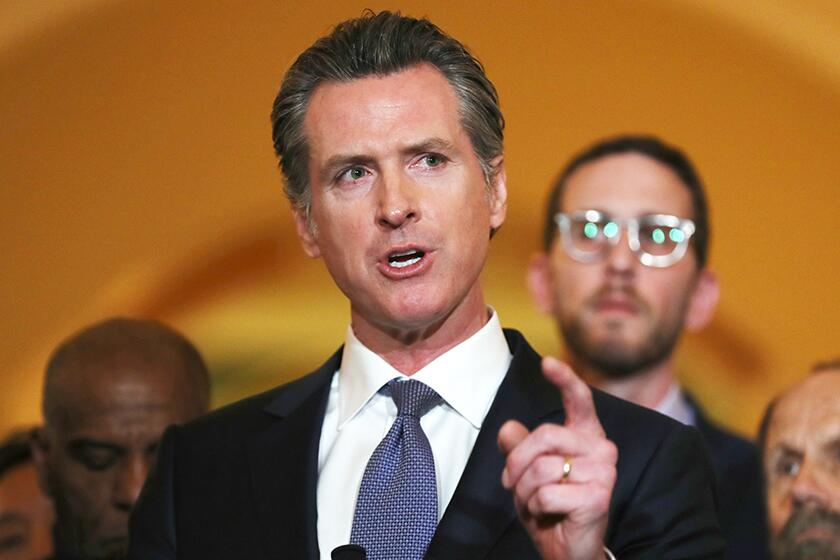Facing Virtual Unknowns May Be Gov.’s Biggest Reelection Hope
- Share via
Sacramento — Gov. Arnold Schwarzenegger took a bruising fall at the ballot box. The question now is whether he can pick himself up and win his race for reelection. And that will largely depend, of course, on who he runs against.
Forget Warren Beatty and Rob Reiner. They are not going to run. They don’t want to, at least in 2006, both actor/directors have told me.
Beatty keeps playing this game: He hints at a possible gubernatorial run to attract news media attention to his anti-Schwarzenegger message. And the news media play along, because Beatty’s name attracts readers and viewers.
Reiner’s political focus next year will be on promoting his ballot initiative to establish voluntary preschool for all 4-year-olds.
One reason Beatty and Reiner won’t run for governor is because neither could win. Schwarzenegger, ironically, is too weak. Think about it: Why would voters replace one failed actor-governor with another actor?
Schwarzenegger was fortunate. Ronald Reagan paved the way from Hollywood to Sacramento for an actor. But now Schwarzenegger has messed up the trail.
Democratic insiders and junkies fantasize about Leon Panetta jumping into the race. He’s the former Monterey congressman, chief of staff for President Clinton and current university think-tank pundit, who’s a knowledgeable and skilled visionary.
But Panetta passed up his best chance to run in 1998 when his name ID was higher and he had greater access to campaign contributions.
Starting this late in the contest to raise enough money, say $30 million, would be a herculean task, especially under new campaign rules that limit individual donations to $22,300. Anyway, Panetta has shown little interest.
U.S. Sen. Dianne Feinstein could have saved Californians a lot of grief -- energy debacle, budget deficit, governor’s recall -- if she’d run for the job in 1998. It was virtually hers for the asking. But she got cold feet, fearing a heated primary battle so soon after surviving a bloody reelection race in 1994. She’s running for reelection again next year and seems a shoo-in.
Atty. Gen. Bill Lockyer was in good position to run for governor, but dropped out when Schwarzenegger still was popular. Now he’s running for treasurer.
So it’s looking like this for Democrats: Their choices to compete against Schwarzenegger are Treasurer Phil Angelides or Controller Steve Westly.
“The fact is, nobody has a clue who either one of these guys is,” says Garry South, a Westly advisor who was Gov. Gray Davis’ longtime strategist.
Indeed, a Times poll last month showed that both Angelides and Westly are pretty obscure.
Asked their impression of Angelides, 72% of surveyed voters had none. And 82% had no impression of Westly.
Two years ago, Angelides, 52, positioned himself as the anti-Arnold. The crusader for Democratic values. The party activists’ candidate. The lib.
“This governor has spent a full year running down our state, running down our schools, running down our public servants, talking as if they were a bunch of broken-down gym equipment,” Angelides says.
“I believe Californians are ready for a governor who will lift up their hopes ... who is truly interested in governing, not campaigning each and every day. Who doesn’t view the state as a big political pin cushion....
“Schwarzenegger’s core values are wrong for California. He believes in less investment in education ... and, like the Republicans in Washington, borrowing rather than fiscal responsibility.
“I intend to run a campaign that offers the clearest choice in a generation for Californians.”
Westly, 49, promotes himself as the safe, centrist option for swing voters.
“An awful lot of people who backed Schwarzenegger last time are going to be looking for a Democratic alternative,” Westly says, “and I believe I’m the only Democrat who can beat Arnold.”
Why him and not Angelides? “I’m a problem solver, not a politician. He’s spent his career in Sacramento. He’s an insider.”
Of course, the next time voters elect a governor they may want one with more political experience.
Westly built a dotcom fortune at EBay, taught business at Stanford and barely won the controller’s office in 2002, spending his own money. He claims credit for successfully implementing a Legislature-passed tax amnesty program that has earned the state more than $2 billion.
Angelides, a housing developer and former state Democratic chairman who was elected treasurer in 1998, hopes to ignore Westly and concentrate his fire on Schwarzenegger.
He never has been scared to advocate a tax increase -- especially on the rich -- to “invest” in better schools and roads. “We’re not going to be the best by doing it on the cheap,” he says.
Isn’t he afraid of driving jobs out of state? “We will lose businesses if our schools deteriorate, if we don’t have a good transportation system and if we despoil our environment.”
Westly cozily campaigned with Schwarzenegger in early 2004 for the governor’s $15-billion deficit-reduction bond that allowed the state to avoid a tax hike but piled a huge debt on the credit card. And he’d do it again, he says.
“Absolutely.... A tax increase should be the last place Democrats look, not the first.”
Angelides and Westly presumably will grow as candidates. Schwarzenegger is likely to heal his wounds and be a stronger runner next fall.
Now, however, only one thing seems certain: The realistic options to Schwarzenegger will be Angelides or Westly. Resign yourselves.
More to Read
Get the L.A. Times Politics newsletter
Deeply reported insights into legislation, politics and policy from Sacramento, Washington and beyond. In your inbox twice per week.
You may occasionally receive promotional content from the Los Angeles Times.











